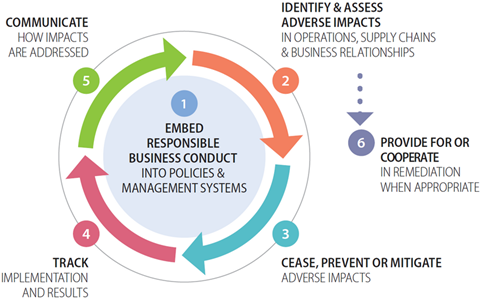Human Rights Obligations of Companies: International Regulation and Shifts in Focus
In recent decades, the relationship between businesses and human rights has shifted significantly, emphasizing shared responsibilities between states and businesses. With globalization, companies are increasingly expected to address human rights impacts across their operations and supply chains.
This article explores the evolution of business and human rights law, examines the EU framework in this context, and highlights the significance of human rights due diligence for companies.
Development of Business and Human Rights Law
Under international law, states are the primary duty-bearers for protecting human rights. In certain circumstances, however, states can be responsible for business activities that violate human rights treaties. States may for example be held responsible for human rights violations by businesses they control or when they fail to prevent or address abuses by other private entities, as part of their so-called positive obligation to protect human rights. Due diligence by states includes enacting legislation, conducting investigations, and providing remedies.
Traditional international law, predominantly focused on state actions and sovereignty, has grappled with addressing the growing role of businesses in the global legal order. However, as businesses expanded internationally, their direct involvement in human rights violations became increasingly apparent. The rise of multinational enterprises has posed significant challenges for victims of corporate human rights abuses, as traditional international instruments fell short in offering avenues to seek adequate remedies against non-state actors.
For over 30 years, efforts to develop universal international standards addressing adverse human rights impacts of transnational corporations had not succeeded. However, the adoption of the United Nations Guiding Principles on Business and Human Rights (UNGPs) in 2011 marked a new direction. These principles have played a pivotal role in harmonizing international regulation and established that the reality of business participation in international law differs from the dominant state-only approach. The UNGPs have now become the ‘global authoritative standard’ for business and human rights, influencing both international and national regulations and case law.
UNGPs: understanding the main principles
The obligation of companies to respect human rights is not immediately apparent, as international human rights law primarily establishes vertical obligations—regulating the relationship between states and individuals—rather than horizontal obligations, which would directly govern interactions between private parties. However, the UNGPs address this gap, conceptualizing the human rights responsibilities of businesses.
According to General Principle 11 of the UNGPs:
"Business enterprises should respect human rights. This means that they should avoid infringing on the human rights of others and should address adverse human rights impact with which they are involved.”
For businesses, ‘respecting’ human rights entails avoiding violations, refraining from facilitating or contributing to such violations, and addressing adverse impacts where they occur. An adverse human rights impact arises when an action impairs an individual's ability to enjoy their human rights.
The UNGPs define the material scope of these human rights obligations by referring to the following foundational instruments:
- the Universal Declaration of Human Rights (1948);
- the International Covenant on Economic, Social and Cultural Rights (1966);
- the International Covenant on Civil and Political Rights (1966).
In addition, businesses must uphold the fundamental rights outlined in the International Labour Organization’s Declaration on Fundamental Principles and Rights at Work, which includes the freedom of association, the elimination of forced labour and the abolition of child labour.
General Principle 13 of the UNGPs further specifies a twofold responsibility for businesses:
- Avoidance and remediation: Companies must avoid causing or contributing to adverse human rights impacts through their own activities and take remedial action when such impacts occur.
- Prevention and mitigation: Businesses must prevent or mitigate adverse human rights impacts directly linked to their operations, products, or services through their business relationships, even if they are not directly responsible for these impacts.
To operationalize these responsibilities in the context of business relationships, the concept of leverage is introduced in the Commentary to General Principle 19 of the UNGPs. Leverage exists where a business has the ability to effect change in the wrongful practices of another entity that causes harm. If a company lacks the leverage to influence a partner's harmful practices, it may consider ending the business relationship. However, such decisions must account for the potential adverse impacts on affected individuals or communities.
To meet their responsibility to respect human rights, the UNGPs requires companies to implement policies and processes appropriate to their size and operational context. A central component of this is Human Rights Due Diligence (HRDD), which involves:
- identifying human rights risks and impacts;
- preventing and mitigating these risks;
- addressing adverse impacts;
- tracking and reporting on measures taken to ensure accountability.
HRDD serves as a comprehensive framework that enables companies to manage human rights impacts effectively, both within their internal operations and across their supply chains:

These principles form the cornerstone of corporate human rights obligations, serving as the foundation for the OECD Guidelines for Multinational Enterprises (revised 2011) and underpinning the framework for European human rights and due diligence obligations (as detailed below).
EU business and human rights framework
The impact of the UNGPs on domestic legal systems is evident in landmark cases. For instance, in Four Nigerian Farmers v. Shell, the Hague Court of Appeal in the Netherlands expanded the scope for civil claims against parent companies for the actions of their subsidiaries. Similarly, in Milieudefensie v. Royal Dutch Shell plc, the Dutch courts found that human rights may also impact private law relationships, by citing the UNGPs, the OECD Guidelines and various other soft law instruments.
Following the introduction of the French Corporate Duty of Vigilance Law (2017) and the German Supply Chain Due Diligence Act (2021) - both of which require large companies to conduct due diligence to identify and address human rights risks in their operations and supply chains - the EU has established a comprehensive framework to enforce corporate respect for human rights. While these obligations are distributed across various legal instruments, they fundamentally align with the principles outlined in the UNGPs and the OECD Guidelines. These frameworks collectively emphasize the need for businesses to assess risks, prevent and mitigate adverse human rights impacts, and provide remediation where necessary.
- Taxonomy Regulation (2020): Businesses must meet ‘minimal safeguards’ aligned with the OECD Guidelines and UNGPs to qualify as a sustainable business;
- CSRD (2022): Requires companies to disclose human rights risks and due diligence efforts, enhancing corporate transparency;
- CSDDD (2024): Introduces mandatory due diligence across value chains, with liability for harms resulting from non-compliance;
- Conflict Minerals Regulation (2017): Mandates due diligence in sourcing tin, tungsten, tantalum, and gold to prevent links to conflict financing and abuses;
- Batteries Regulation (2023): Imposes due diligence obligations to ensure responsible sourcing of battery materials like cobalt and lithium;
- Deforestation Regulation (2023): Ensures products entering the EU are deforestation-free, with due diligence required for high-risk commodities;
- Critical Raw Materials Act (2024): Requires companies to address human rights risks in sourcing critical materials;
- Forced Labour Regulation (2024): Prohibits the sale of products made with forced labor in the EU market.
Conclusion: Adapting to a New Era of Corporate Accountability
The evolution of the international legal framework for business and human rights underscores the growing recognition of shared responsibilities between states and businesses. National laws are increasingly integrating elements of the UNGPs, and courts are applying international standards to hold businesses accountable for human rights violations. In the EU, this trend is reinforced through regulations such as the CSDDD, which mandates companies to identify, prevent, and mitigate adverse human rights and environmental impacts across their value chains, and the CSRD, which enhances transparency by requiring detailed disclosures on human rights due diligence.
In this changing legal environment, businesses must embrace human rights due diligence not only to comply with these evolving regulations but also to align with broader societal expectations. While this shift introduces challenges, it also presents an opportunity for enterprises to differentiate themselves, foster stakeholder trust, and strengthen their global standing in an increasingly accountable and sustainable business landscape.
Guan Schaiko holds a European master's degree in Human Rights and Democratisation from the University of Seville and was a teaching fellow at the Human Rights Institute of KU Leuven. Feel free to reach out to him for any questions regarding the abovementioned topics.


